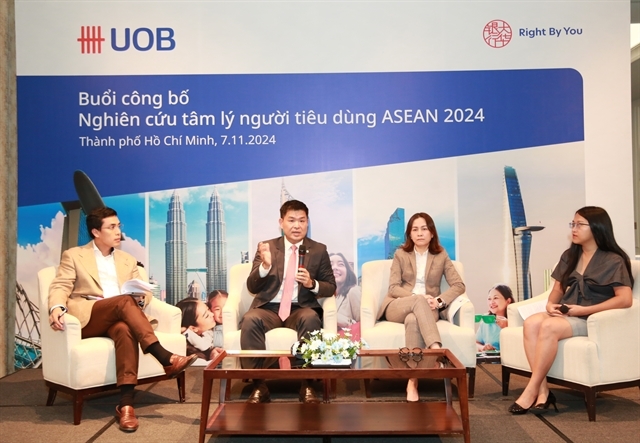Vietnamese consumers most optimistic in ASEAN about economy: UOB
Society – Economy - Ngày đăng : 09:12, 11/11/2024

Conducted in collaboration with Boston Consulting Group, the UOB’s fifth annual ASEAN Consumer Sentiment Study (ACSS), released on November 7, assessed consumer trends and sentiments in Singapore, Malaysia, Indonesia, Thailand and Vietnam.
The ACSS 2024 showed over 70% of Vietnamese respondents expressing confidence in the country's economic performance for the next six to 12 months, 18 percentage points above the regional average. The positive sentiment followed Vietnam's strong economic recovery in the first half of 2024, where gross domestic product surged by 6.42%, a significant rise from the 3.84% growth a year ago.
UOB's latest economic forecast issued last month also revised the country’s full-year GDP growth to 6.4%, up from 5.9%, following remarkable third-quarter GDP growth of 7.4%.
Vietnamese consumers were also the most optimistic about personal finances, with 90% expecting to be financially stable or better off by June 2025, followed by Indonesia (89%) and Thailand (82%).
“It is encouraging to see Vietnamese consumers leading the region in optimism around local economic conditions, with the upbeat sentiment likely contributing to the exuberance in cross-border spending. This reflects Vietnam's success in promoting stable economic growth and deepening its regional integration,” said Paul Kim, head of Personal Financial Services, UOB Vietnam.
The regional study indicated that despite recession fears easing from last year, 77% of Vietnamese consumers were still worried about financial-related matters, with Gen Z showing the highest level of concern (87%).
Rising inflation remained the top financial worry, cited by 60% of respondents, followed by increased household expenses (53%). However, these figures represent a six percentage point and nine percentage point decrease, respectively, from last year’s levels, indicating reduced stress around domestic price increases.
Declining global inflation has eased Vietnam’s import price pressures, with the average import price index for the first nine months of 2024 down 1.73% year-on-year. Lower global oil prices have also positively impacted Vietnam’s consumer price index, which remains at 3.9% year-to-date - below the government target of 4% – 4.5%.
Increased spending on experiences and travel
Over the past year, Vietnamese consumers had increased spending on essentials, with the top three items that they spent more on being children’s education (42%), healthcare (33%) and utilities (33%).
They also spent more on experiences such as vacations, fine dining, concerts, and festivals than their regional peers, with 42% reporting increased expenditure in these areas compared to the ASEAN average of 35%.
Despite the rise in experiential spending, close to 60% of Vietnamese consumers had set aside at least three months of expenses for emergencies, exceeding the regional average of 54%.
Nearly half of respondents said they regularly save over 20% of their monthly income, driven mostly by Gen Y (those born between 1981 and 1996).
Additionally, appetite for investment was also robust, with 63% of Vietnamese consumers allocating over 10% of their income to investments, 10 percentage points above the regional average.
